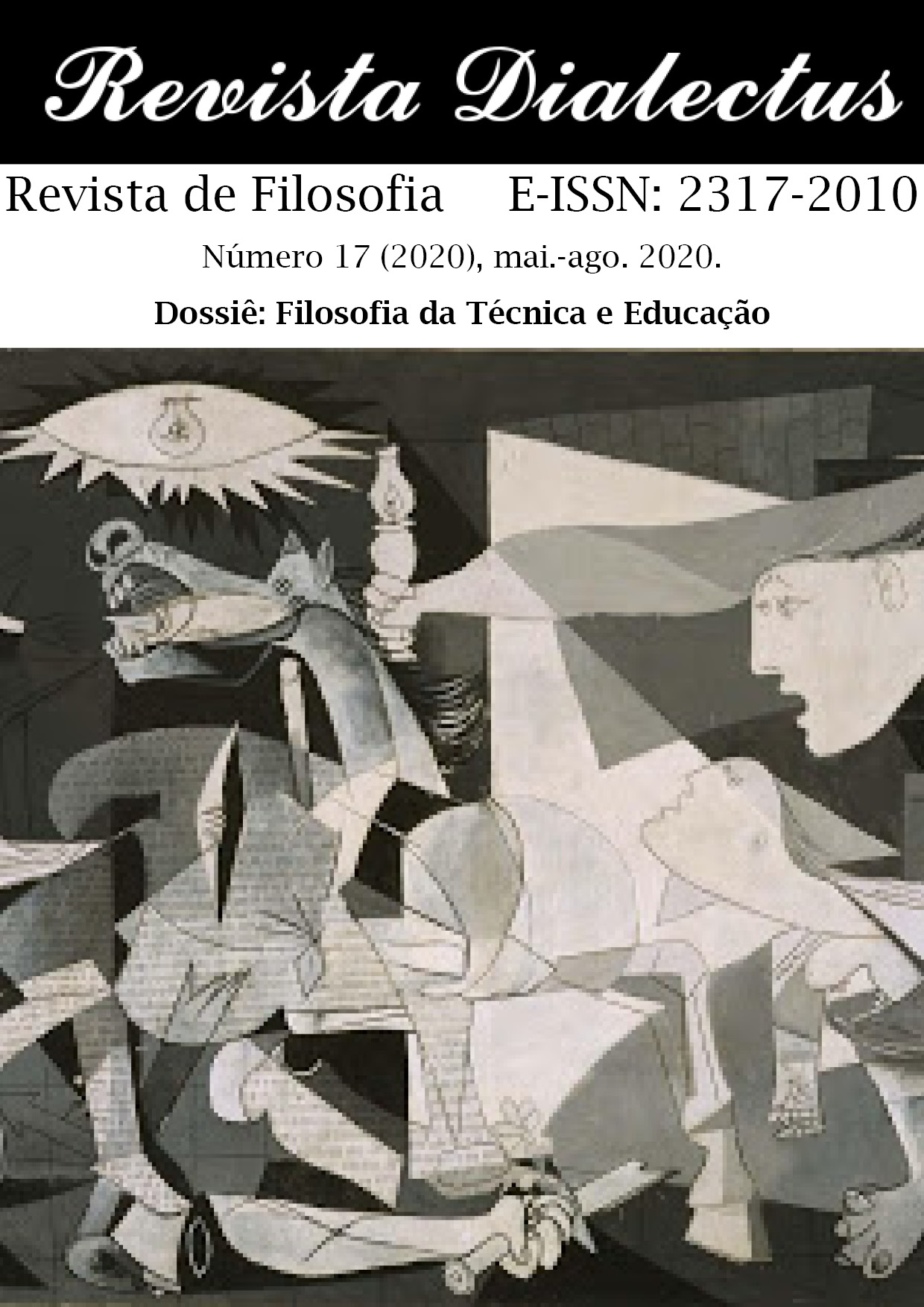A NATUREZA DA TECNOLOGIA E SEU ENSINO
DOI:
https://doi.org/10.30611/2020n17id60616Keywords:
Filosofia, Tecnologia, Design, Educação tecnológica, EnsinoAbstract
A investigação filosófica sobre a tecnologia tem ocupado cada vez mais espaço na agenda dos filósofos profissionais das mais diversas tradições. Com o objetivo de expandir a reflexão filosófica sobre o respectivo tema, o presente texto, busca esclarecer os principais elementos associados à natureza da tecnologia, analisando, consequentemente, as implicações que os mesmos exercem na educação tecnológica. Primeiramente, afastamos a concepção reducionista de tecnologia como ciência aplicada e de tecnociência, alegando que há boas razões para sustentar uma emancipação epistêmica fraca da tecnologia em relação à ciência. Em seguida, falaremos sobre as especificidades que envolvem a educação tecnológica associadas principalmente ao processo de design. Por fim, consideramos a possibilidade de desenvolver uma autêntica e efetiva educação tecnológica.
References
ECHEVERRÍA, Javier. La revolución tecnocientífica. Madrid: Fondo de Cultura Económica de España, 2003.
FEIBLEMAN, J. Pure science, applied science, and technology: An attempt at definitions. In: Philosophy and technology: readings in the philosophical problems of technology. New York: The Free Press, 1983.
INKSTER, Ian. (Ed.). History of technology. New York: Continuum, 2009.
JARVIE, I.C. Technology and the structure of knowledge. In: MITCHAM, C. MACKEY, R. Philosophy and technology: reading in the philosophical problems of technology. New York: The Free Press, 1983.
MACLEAN, R., & WILSON, D. Introduction. In R. Maclean& D. Wilson (Eds.), International handbook of education for the changing world of work (pp. lxxiii–cxii). Dordrecht: Springer. 2009.
MICHAEL, M. How to understand mundane technology: new way so thinking about human-technology relations. In: DAKERS, J. R. (Ed.). Defining technological literacy towards and epistemological framework. New York: Palgrave Macmillan, 2006.
MITCHAM, C. Thinking through technology: the path between engineering and philosophy. Chicago: The University of Chicago Press, 1994.
PETROSKI, H. The evolution of use things. New York: Vintage, 1994. PITT, J. Philosophy, engineering, and the sciences. In: POEL, Ibo van de; GOLDBERG, David E (Editors). Philosophy and engineering: an emerging agenda. New York, Springer, 2010.
QUERALTÓ. R. Ética, tecnología y valores en la sociedad global: el caballo de troya al revés. Madrid: Editorial Tecnos, 2003.
________. Technology as a new condition of possibility of scientific knowledge. In: Phil & Tech 4:2 Winter, 1998.
WILLIAMS, P. J. Vocation and general technology education. In: WILLIAMS, P.J.; JONES, A.; BUNTTING, C. (Eds). The future of technology education. [S/R].
VRIES, Marc J. Translating customer requirements into technical specifications. In: MEIJERS, Anthonie W.M. (Editor). Philosophy of technology and engineering sciences (Handbook of the philosophy of science). Amsterdam, Elsevier, 2009.
SIMONDON, G. El modo de existencia de los objetos técnicos. Buenos Aires: Promoteo Libros, 2007.
SKOLIMOWSKI, H. The structure of thinking in technology. In: MITCHAM, C. MACKEY, R. Philosophy and technology: reading in the philosophical problems of technology. New York: The Free Press, 1983.
SZCZEPANIK, G. 2017. O design como um modelo metodológico para a tecnologia. Pensando – Revista de Filosofia. Teresina. Vol. 8, n.15, 2017.
________. A relação entre ciência e tecnologia a partir de três modelos teóricos distintos. Dois pontos: Curitiba, São Carlos. Vol. 12, n. 1, abril de 2015.
Downloads
Published
Issue
Section
License
Authors who publish in this journal agree to the following terms:
- Authors retain the copyright and grant the journal the right of first publication, with the work simultaneously licensed under the Attribution-NonCommercial-NoDerivatives 4.0 International (CC BY-NC-ND 4.0) License, which allows the non-commercial sharing of work, without modifications and with acknowledgment of authorship and initial publication in this journal.
- Authors are authorized to take additional contracts separately, for non-exclusive distribution of the version of the work published in this journal (eg publish in institutional repository or as a book chapter), with acknowledgment of authorship and initial publication in this journal.
- Authors are allowed and encouraged to publish and distribute their work online (eg in institutional repositories or on their personal page) at any point before or during the editorial process, as this can generate productive changes as well as increase the impact and citation of published work (See The Free Access Effect).



















